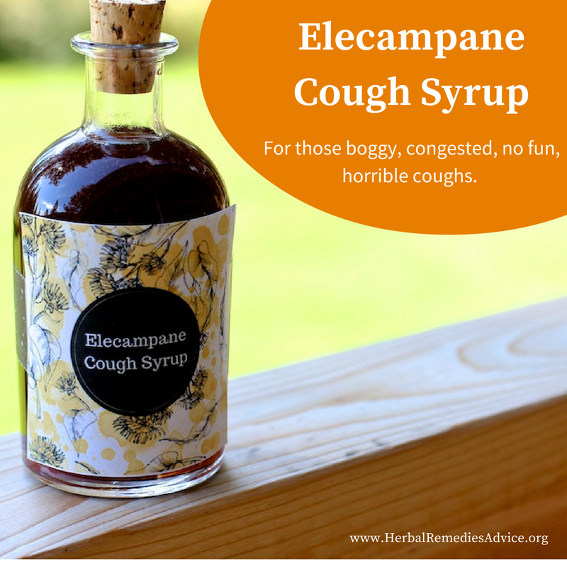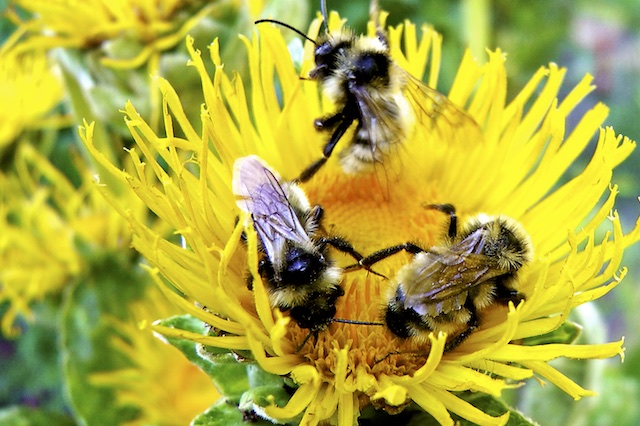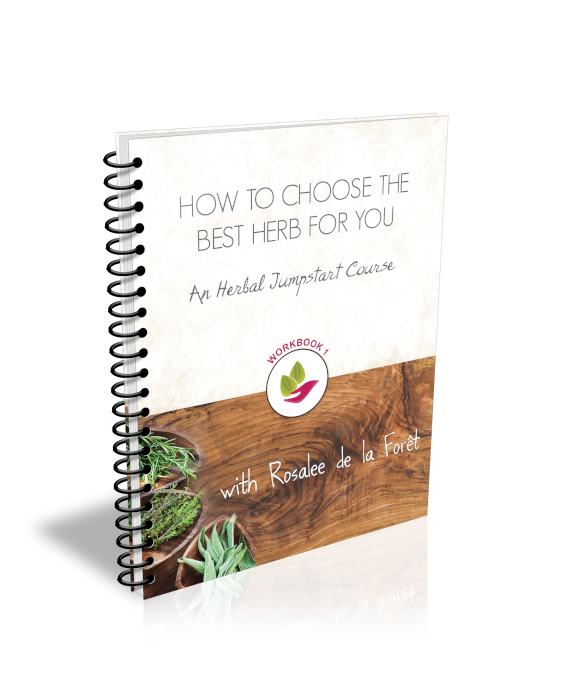Get weekly tips, recipes, and my Herbal Jumpstart e-course! Sign up for free today.

Homemade Cough Syrup
Elecampane Syrup for Boggy, Congested, Thick, No-Fun Coughs
Share this! |
|
Elecampane root is one of the best herbs for boggy and congested coughs. I keep a good supply of it available for our family every winter and save enough to give out to friends and family.
But here’s the thing about elecampane. It works amazingly well for certain coughs, but it does not taste like sunshine and roses. And yes, I have a story about that…
Many years ago I was in the kitchen slicing up a bunch of fresh elecampane roots when my husband walked by. I gave him a slice of the root to chew and he willingly popped it in his mouth. After just a few seconds of chewing he gave me this intense look as if I had betrayed him. I guess I should have warned him he wasn’t about to eat something yummy! Ever since that day he has been more suspicious when I hand him something to “try”.
While most people wouldn’t describe elecampane root as delicious, its taste is actually a very important key to understanding its medicinal qualities (see my extended article on elecampane uses here)
The Importance of the Taste of Herbs to Make a Successful Homemade Cough Syrup
Before we had microscopes and petri dishes, tasting a plant was one of the best ways to determine how it worked in the body. And while I think the research coming out of microscopes and petri dishes is fascinating, I strongly believe that evaluating and understanding the taste of an herb is one of the most important skills an herbalist can have. And I’m not alone! While we don’t often talk about taste in western herbalism, the taste of an herb is still an important part of both Traditional Chinese Medicine and Ayurveda.
So what can the taste of elecampane tell us about how it works?
Elecampane is both strongly bitter and pungent (it has a certain degree of sweetness in there as well, but for now we’ll stick with the first two).
All About the Bitter Taste
Purely bitter herbs tend to be cooling, drying and eliminating. We often think of the bitter taste we experience on our tongue, but scientists have discovered that we actually have bitter taste receptors all over our body, including our stomach, pancreas, intestines and even our lungs.
Western herbalists are fond of using bitter herbs for digestion, and elecampane root has been used for hundreds of years for a variety of digestive complaints. I recently read an article from Guido Masé exploring how the bitter taste strengthens the heart.1 (That is especially interesting since in Traditional Chinese Medicine the bitter taste is correlated to the heart.)
New research has shown that bitter herbs strongly influence the lungs and increase breath capacity. Scientists have surmised that the bitter taste can be used to help people with breathing problems such as asthma.2 Herbalists know we’ve been using bitter herbs, like elecampane, to strengthen the lungs for a very long time!
So to recap, the bitter taste of elecampane tells us that it is most likely helpful for digestion and the lungs.
All About the Pungent Taste
Elecampane is also strongly pungent.
Pungent is admittedly a bit of a strange term. I’ve heard that many people think of pungent and relate it to a skunk. We aren’t talking about that kind of pungent.
Pungency is a term used in herbalism to describe spicy and aromatic herbs. These herbs are often high in essential oils and have a strong taste and smell. Ginger, garlic and lavender are all herbs that could be described as pungent. It’s interesting to note that while bitter is bitter is bitter, pungency comes in a variety of ways. For example, the pungency of horseradish root is very different than the pungency of cardamom.
Pungent herbs are generally warming, stimulating and drying. We use them to excite tissues, move stagnancy and increase warmth. A great example of this is heating a hot and spicy soup when you have congested sinuses. The pungent qualities of the soup can break up congested mucus and help you to breathe freely again.
Pungent herbs are often used to warm up someone’s digestive fire and strengthen digestion. As discussed above, pungent herbs are also used to break up mucus congestion in the upper respiratory tract as well as the lungs.
While this is just a quick glimpse of the qualities of bitter and pungent, we can begin to tease out a big picture view of elecampane.
Bitter + Pungent = ???
Both the bitter and pungent tastes can help with digestion and with respiration. And while bitter herbs tend to be cooling and pungent herbs can be warming, both of these qualities tend to be drying.
So the taste of elecampane root indicates that it probably has benefits for coughs, but not just any cough. Because this root is drying, we probably wouldn’t reach for it for dry, irritating and spasmodic coughs. Instead, we want to use it when there is an excess moisture in the lungs and they are congested, thick and filled with mucus. This is really important! If the lungs are filled with mucus we don’t want to suppress a cough. Instead, we want to support the cough in order to help get the mucus out of the lungs.
Elecampane root is perfect for boggy and congested coughs because it stimulates the flow of mucus, helping to expel it from the lungs.
One of my favorite ways to use elecampane root is to infuse the fresh root in honey. The honey pulls out the moisture from the roots and the result is a sweet but strong fresh syrup. However, over the years I’ve often been asked how to make something out of elecampane roots if all you have is the dried root. The dried root also makes great herbal medicine; we simply have to prepare it differently, as described below.
Homemade Cough Syrup with Elecampane Root
This simple homemade cough syrup is a powerful ally for congested coughs. It can be used both for acute coughs and chronic coughs. The rosehips further help to expectorate, plus they give the syrup a thicker consistency than regular honied syrups. Of course the honey in the recipe is also part of the medicine, as it can coat and soothe a sore throat and it also has mild expectorant qualities. I recommend using high quality honey bought directly from a local beekeeper.
Ingredients
- 1/4 cup dried elecampane root (25 grams)
- 1/4 cup dried and chopped rose hips (35 grams)
- 1 pint water
- 1/2 cup to 1 cup local, raw honey
Simmer the elecampane root, rosehips and water for 25 minutes, covered. Strain off the herbs.
Measure the liquid to determine how much honey to add. (If you add an equal amount of honey to the water, the syrup should keep for a very long time*.)
Tip: Add the honey while the mixture is still warm. If necessary, very gently warm the liquid until the honey fully combines. The less heat you add the better to preserve the raw qualities of the honey.
Store it in the fridge.
To use: This syrup is ideal for congested coughs and sore throats. Adults can use 1 teaspoon every 30 minutes.
*If you prefer things less sweet, then adding less honey is fine. Keep it stored in the fridge and use quickly.
Click here to get the free label for your homemade cough syrup!
Citations
Click to show/hide.
Rosalee is an herbalist and author of the bestselling book Alchemy of Herbs: Transform Everyday Ingredients Into Foods & Remedies That Healand co-author of the bestselling book Wild Remedies: How to Forage Healing Foods and Craft Your Own Herbal Medicine. She's a registered herbalist with the American Herbalist Guild and has taught thousands of students through her online courses. Read about how Rosalee went from having a terminal illness to being a bestselling author in her full story here.



